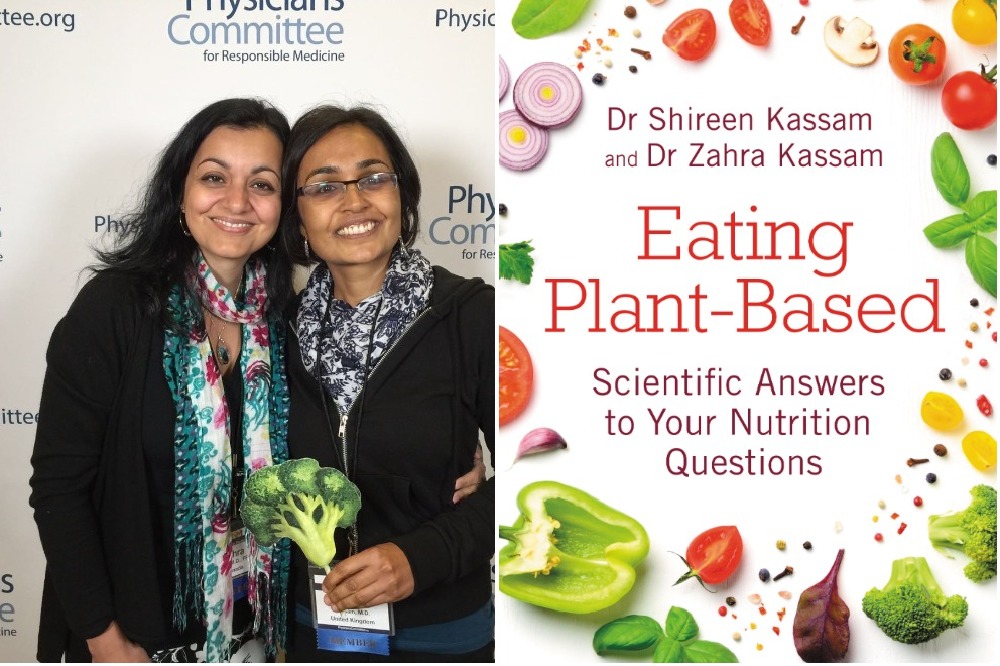There is a growing interest in adopting a plant-based diet as more and more people recognise the benefits for personal and planetary health. Whether you are considering a transition to a 100% plant-based diet or just reducing your intake of animal foods, here are some of our top tips to help you on your way.

Dr Shireen Kassam & Dr Zahra Kassam, Eating Plant-Based
Focus on variety. A plant-based diet is all about adding in an abundance and variety of colourful and healthy plant foods. In general our diets tend to focus on only a handful of foods, but when it comes to our health it seems that it is the variety and number of plant foods that matter most. Aim to try a new fruit, vegetable or bean each week and slowly build up the repertoire of foods you eat.
Go at your own pace. There is no right or wrong way to move towards more plant-based eating. Some people like to do this overnight whilst others like to incorporate more plant-based meals gradually. It can help to take some time with planning. Think about the meals you cook most often at home and consider how you can make a plant-based version. Swap the mince for lentils or the chicken to beans. Once you have a basic plan for the week you can stock up your pantry to make sure the ingredients are in easy reach.
Add in soya foods to your diet. Soya foods such as tofu, tempeh, edamame beans and soya milk are a great addition to any diet pattern. They are versatile, adaptable to a variety of cuisines and easy to prepare. Soya is also associated with a number of health benefits including lowering blood cholesterol, improving heart health and reducing the risk of certain cancers.
Find a plant-based milk that you like. There is such an enormous choice of plant-based milks that there really is something to suit every taste. It might take you a few tries to find the right one for you and it may be that what you like in tea and coffee is different to what works in your porridge. Supermarket own brands tend to be the cheapest and be sure to choose ones that are fortified with calcium but without added sugars. Soya, oat and pea milks are good options when considering health and sustainability.
Carry healthy plant-based snacks: It’s always useful to have a few go to plant-based snacks for when you are on the go. A portion of nuts and seeds, some dried or fresh fruit or a plant-based protein bar (with natural ingredients) can be useful to carry around with you on busy days.
Try to cook from scratch: When you first move away from animal foods it can be tempting to replace them with plant-based meat alternatives that have been manufactured to replicate the taste and texture of meat. Although these new products can be useful in social situations or as an occasion food, to reap the health benefits of a plant-based diet it’s best to try and cook from scratch as much as possible. Although this can seem daunting at first, with a bit of planning and just a handful of tasty simple recipes, this does not have to be too time consuming. Batch cooking, storing portions in the freezer and learning some one-pot recipes can be useful.
Learn to use herbs and spices: For all cuisines, the true flavour comes from using a variety of herbs and spices. Not only does this increase the nutritional value of the dishes but really enhances the enjoyment. Plant-based cooking lends itself to all cultural cuisines including Indian, Chinese and Thai.
BONUS: Finally, don’t go it alone. Find a friend or family member to share your plant-based journey with you. This way you will find the transition fun and more sustainable.
Shireen is founder of Plant-based health professionals UK- www.plantbasedhealthprofessionals.com
Zahra is co-founder of Plant-Based Canada- www.plantbasedcanada.org
You can buy and read the first chapter for free here:Eating Plant-Based (hammersmithbooks.co.uk)

Tagged in Plant Based

